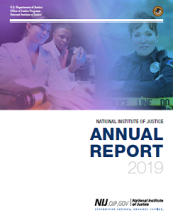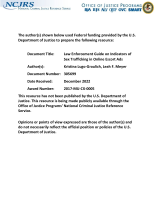Sex trafficking
Interdicting Restructuring Networks with Applications in Illicit Trafficking
Evaluating Victim Services Text and Chat Hotlines
It's a Marathon Not a Race: Exiting the Commercial Sex Trade
A Transdisciplinary Approach for Generating Synthetic but Realistic Domestic Sex Trafficking Networks
“Flexibility and Consistency”: Qualitative Insights on Valuable Skills for Providers Working with Survivors of Child Sex Trafficking
Multi-period Max Flow Network Interdiction with Restructuring for Disrupting Domestic Sex Trafficking Networks
Quantifying the relationship between large public events and escort advertising behavior
Active search of connections for case building and combating human trafficking
Do public events affect sex trafficking activity?
Leveraging publicly available data to discern patterns of human-trafficking activity
Examining the Geography of Illicit Massage Businesses Hosting Commercial Sex and Sex Trafficking in the United States: The Role of Census Tract and City-Level Factors
NIJ FY23 Research and Evaluation on Trafficking in Persons
Gender-Based Violence and the Latinx Community
See the YouTube Terms of Service and Google Privacy Policy
Defining and Studying Elder Abuse Polyvictimization
NIJ Social Science Analyst Yunsoo Park shares her knowledge about elder abuse, a widespread issue in the U.S. and around the world, particularly polyvictimization — the experience of a range of different types of abuse and maltreatment. As much as 11% of community-residing older adults experienced some form of abuse or mistreatment in the past year. Yunsoo discusses risk factors, difficulties in defining and studying elder abuse polyvictimization, and strategies for intervention and prevention. Stacy Lee Reynolds, a Communications Assistant with NIJ, hosts.
National Institute of Justice Fiscal Year 2019 Annual Report
Law Enforcement Guide on Indicators of Sex Trafficking in Online Escort Ads
Understanding, Preventing, and Responding to Human Trafficking
Understanding, Preventing, and Responding to Human Trafficking
Debunking Conventional Wisdom: Using Online Escort Ads in Sex Trafficking Investigations
Evaluation of Services for the Commercial Sexual Exploitation of Children and Youth: A Scoping Review
Embracing Tribal Culture to Build Research Partnerships
Human Trafficking
NIJ funds research on human trafficking and evaluation of promising practices. The overall emphasis for NIJ’s research lies on:
- Strengthening the science of measuring the prevalence of human trafficking
- Preventing trafficking
- Improving the identification, investigation, and prosecution of traffickers
- Identifying best practices for identifying and providing services to victims.
While NIJ focuses on human trafficking as it occurs in the United States, it draws on...






